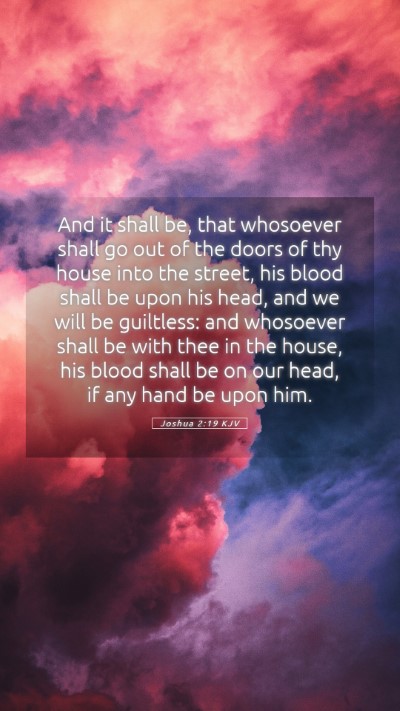Old Testament
Genesis Exodus Leviticus Numbers Deuteronomy Joshua Judges Ruth 1 Samuel 2 Samuel 1 Kings 2 Kings 1 Chronicles 2 Chronicles Ezra Nehemiah Esther Job Psalms Proverbs Ecclesiastes Song of Solomon Isaiah Jeremiah Lamentations Ezekiel Daniel Hosea Joel Amos Obadiah Jonah Micah Nahum Habakkuk Zephaniah Haggai Zechariah MalachiJoshua 2:19 Meaning
What is the meaning of Joshua 2:19?
And it shall be, that whosoever shall go out of the doors of thy house into the street, his blood shall be upon his head, and we will be guiltless: and whosoever shall be with thee in the house, his blood shall be on our head, if any hand be upon him.
Joshua 2:19 Bible Verse Meaning
Bible Verse Meaning of Joshua 2:19
Joshua 2:19 states, "And it shall be, that whosoever shall go out of the doors of thy house into the street, his blood shall be upon his head, and we will be guiltless: and whosoever shall be with thee in the house, his blood shall be on our head, if any hand be upon him."
This verse comes from the account of the Israelite spies sent to Jericho, where they were harbored by Rahab the prostitute. The meaning of this verse carries significant weight, especially in understanding the themes of covenant, protection, and accountability in the context of the unfolding narrative of the Israelites entering the Promised Land.
Verse Explanation and Commentary
The key elements of Joshua 2:19 revolve around the conditions set by Rahab and the implications of the oath taken between her and the spies.
-
Condition of Safety:
Rahab instructs the spies that anyone who leaves her house during the attack on Jericho will take responsibility for their own fate. This stipulation indicates the safety offered within the bounds of her home, which symbolizes God’s protection for those who align with His will.
-
Significance of Oaths:
Matthew Henry's commentary emphasizes the binding nature of oaths and promises in Scripture. The spies’ commitment to protect Rahab and her household illustrates a powerful divine principle of divine protection for those who aid God’s people.
-
Understanding Accountability:
Albert Barnes notes that Rahab’s insistence on the safety conditions reflects a deep understanding of the covenant relationship. Those who chose to leave would be held accountable for their actions and decisions.
-
Symbolic Interpretation:
Adam Clarke points out that the house represents a place of refuge much like the Church, where believers find safety in Christ. The parallels between Rahab’s house and the idea of a sacred space unfold a rich layer of meaning about salvation and security in God.
Historical Context
Understanding the historical context of Joshua 2:19 entails looking at the Israelite conquest of Canaan and the spiritual implications for the Israelites and their enemies. The actions taken by Rahab not only saved her family but also demonstrate the overarching narrative of God’s mercy and inclusion of Gentiles in His plan.
Application of the Verse
For contemporary believers, the applications of Joshua 2:19 resonate strongly. This verse prompts questions regarding who we associate with during times of trial and warns against stepping outside of God’s ordained protection. The fulfillment of promises made in faith brings assurance and unity in the community of believers.
Related Bible Cross References
- Exodus 12:23: The blood on the doorposts during the Passover showcases a parallel to the protection offered by Rahab's house.
- Hebrews 11:31: Highlights Rahab’s faith and her unique position in the lineage of Christ.
- Matthew 7:7-8: The invitation to seek refuge and find safety in God’s promises calls back to Rahab’s faithfulness.
Conclusion
In summary, Joshua 2:19 not only speaks to a specific historical event but also opens up broader themes of protection, covenant, accountability, and faith. Understanding such Bible verses requires diligent study and reflection, allowing for profound Bible verse meanings, interpretations, and applications in our lives today.


